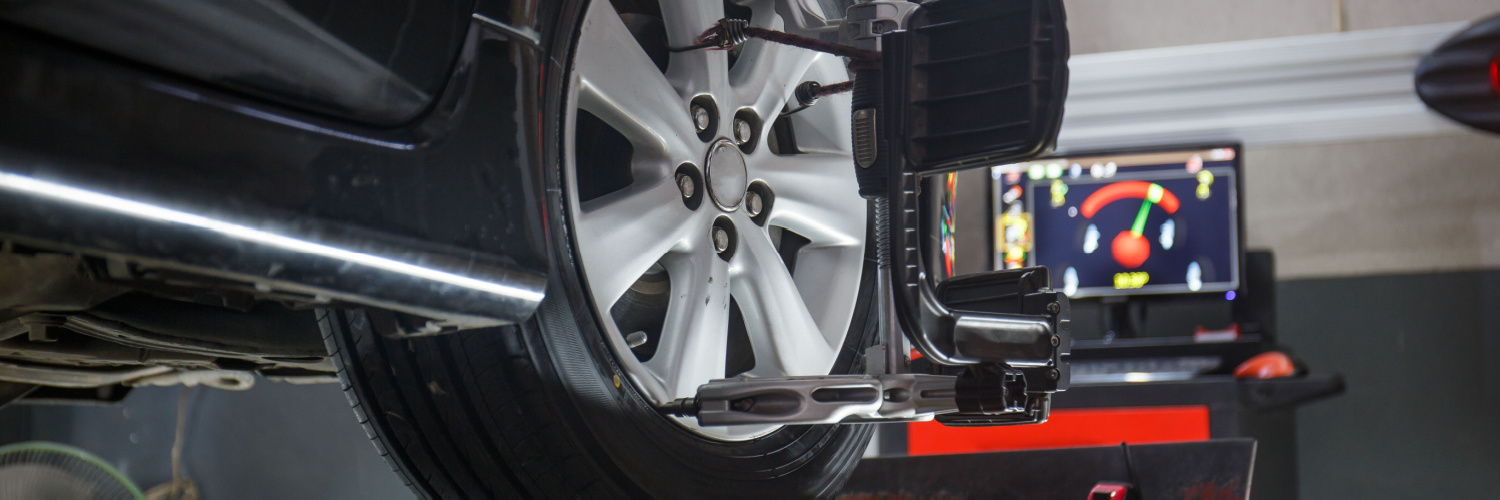Wheel Alignments in Meadowvale, ON

What is Wheel Alignment?
Wheel alignment, also known as tire alignment, refers to the adjustment of the angles of the wheels so that they are parallel to each other and perpendicular to the ground. It involves making precise adjustments to the suspension components, specifically the angles of the wheels, to ensure proper alignment.
Proper wheel alignment is essential for optimal vehicle performance, safety, and tire longevity. Here are the key aspects of wheel alignment:
Camber: Camber refers to the vertical tilt of the wheels when viewed from the front of the vehicle. If the top of the wheel tilts inward (negative camber) or outward (positive camber), it can cause uneven tire wear, handling issues, and reduced stability. Correcting camber angles helps maintain even tire contact with the road surface.
Toe: Toe alignment refers to the angle at which the wheels point inward or outward when viewed from above. Excessive toe-in (wheels pointing inward) or toe-out (pointing outward) can lead to tire scrubbing, uneven tread wear, and compromised handling. Proper toe adjustment ensures the wheels are parallel to each other, minimizing tire wear and promoting straight-line stability.
Caster: Caster angle refers to the forward or backward tilt of the steering axis when viewed from the side of the vehicle. It affects steering stability, cornering ability, and steering wheel returnability. Proper caster alignment ensures balanced steering control and enhances vehicle stability during maneuvers.
Various factors can affect wheel alignments, such as potholes, curb impacts, worn suspension components, and regular wear and tear. Signs of misalignment include uneven tire wear, pulling to one side while driving, steering wheel vibration, or a crooked steering wheel when driving straight.
Is It Bad to Drive a Car Without Proper Alignment?
Driving a car without proper wheel alignment can negatively affect the vehicle’s performance, safety, and tire life. Here are some of the potential issues that can arise:
Uneven Tire Wear: Improper alignment can lead to uneven tire wear, reducing lifespan.
Handling and Stability Issues: Misaligned wheels can cause the vehicle to pull to one side, affecting control and stability.
Reduced Fuel Efficiency: Misalignment increases rolling resistance, decreasing fuel efficiency and increasing fuel consumption.
Suspension and Steering Component Stress: Improper alignment can stress suspension and steering components, leading to premature wear and potential damage.
Safety Concerns: Misaligned wheels can impact braking, traction, and handling, potentially increasing the risk of accidents.
Given these potential issues, it is recommended to have regular wheel alignment checks and adjustments as per the vehicle manufacturer’s recommendations. This helps ensure optimal tire performance, vehicle handling, and safety on the road.
Signs That Your Vehicle Needs Proper Alignment
Several signs can indicate your vehicle needs a proper wheel alignment. If you notice any of the following signs, it may be time to have your vehicle’s alignment checked:
Uneven or Excessive Tire Wear: Misaligned wheels can cause uneven tire wear. If you notice excessive wear on your tires’ inner or outer edges, it may indicate a toe or camber alignment issue.
Vehicle Pulling to One Side: When driving on a straight road, if your vehicle tends to pull to one side without any input from the steering wheel, it could be a sign of improper wheel alignment. This pulling can occur due to uneven camber or toe angles.
Steering Wheel Off-Center: When your vehicle is properly aligned, the steering wheel should be centred and remain straight while driving on a level road. If you notice that the steering wheel is crooked or off-center even when driving straight, it suggests an alignment problem.
Vibrating Steering Wheel: Wheel misalignment can cause vibrations in the steering wheel, particularly at higher speeds. If you experience vibrations or a shimmying sensation in the steering wheel, it may indicate the need for alignment adjustment.
Handling and Stability Issues: Improper wheel alignment can negatively impact your vehicle’s handling and stability. You may notice that the vehicle feels less stable, tends to wander, or less responsive to steering inputs. These issues can compromise your control over the vehicle and affect safety.
Abnormal Tire Noise: Misaligned wheels can cause tires to wear unevenly, increasing tire noise while driving. If you notice unusual tire noise, such as humming or increased road noise, it could be a sign of alignment problems.
It’s important to note that these signs can also indicate other mechanical issues, so it’s advisable to have a professional technician inspect your vehicle to determine the exact cause. Regular alignment checks as part of your vehicle maintenance routine can help prevent premature tire wear, improve handling, and ensure a safer and smoother driving experience.
Choose Halton Automotive Service & Transmission for Wheel Alignment Services in Meadowvale, ON
When it comes to wheel alignment services in Meadowvale, ON, Halton Automotive Service & Transmission is the ideal choice. Our experienced technicians have the expertise to accurately assess and adjust your vehicle’s wheel alignment, ensuring optimal performance and safety.
Furthermore, our shop handles your vehicle with the most up-to-date technology, tools, and equipment. Have any questions regarding your vehicle? Contact us today to speak with a service advisor or schedule your wheel alignment appointment in Meadowvale, ON and experience the difference we can make for your vehicle.

